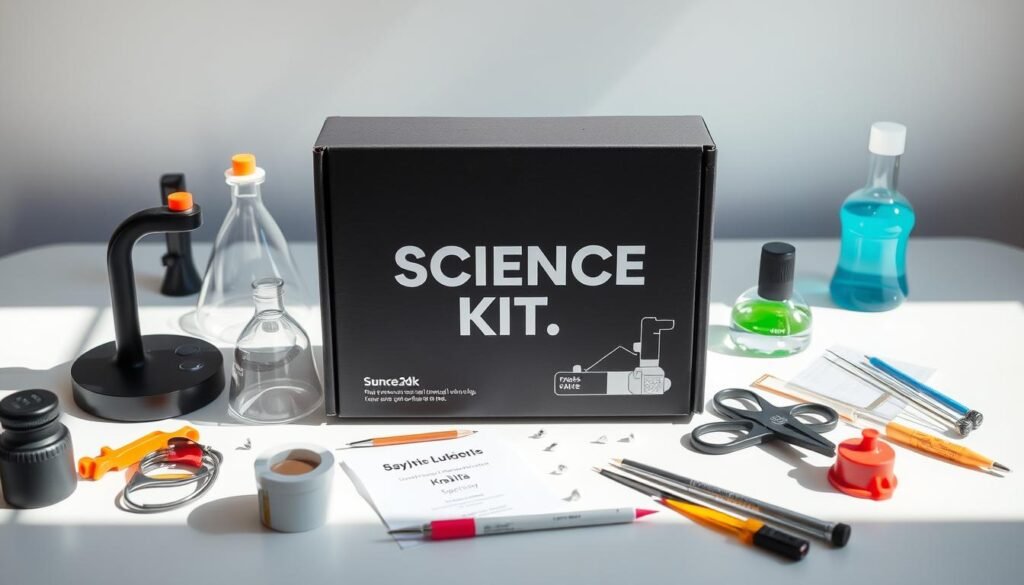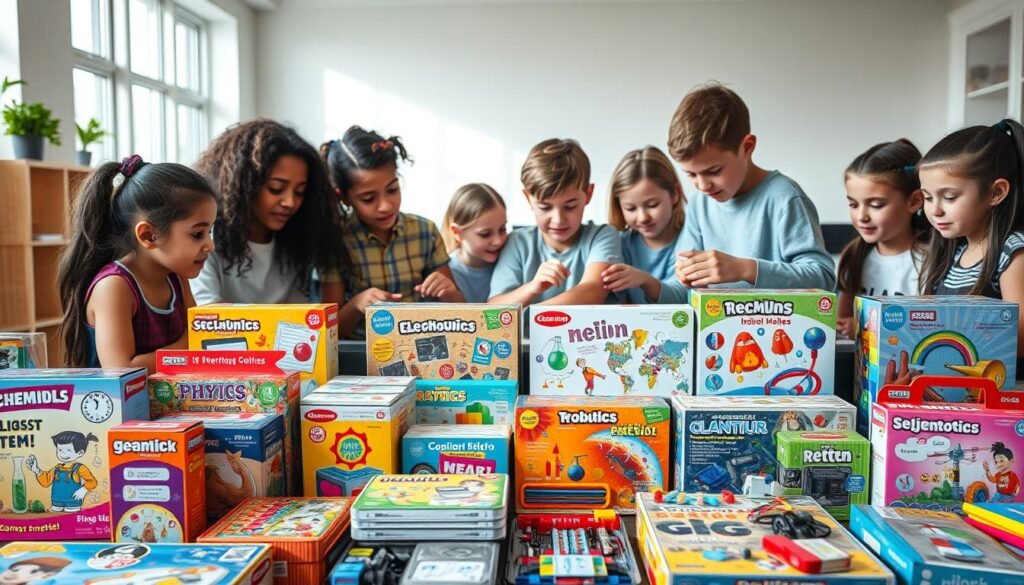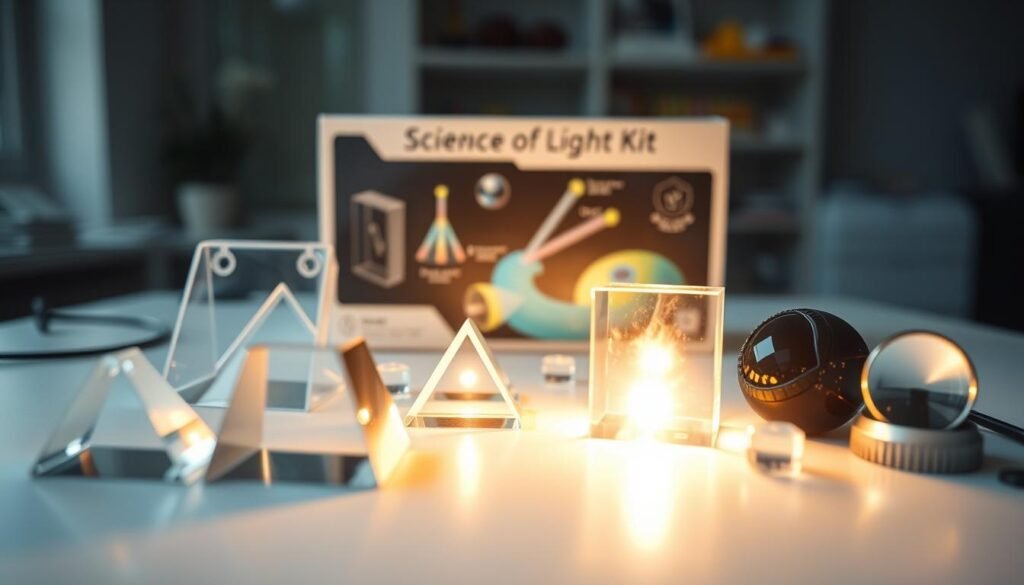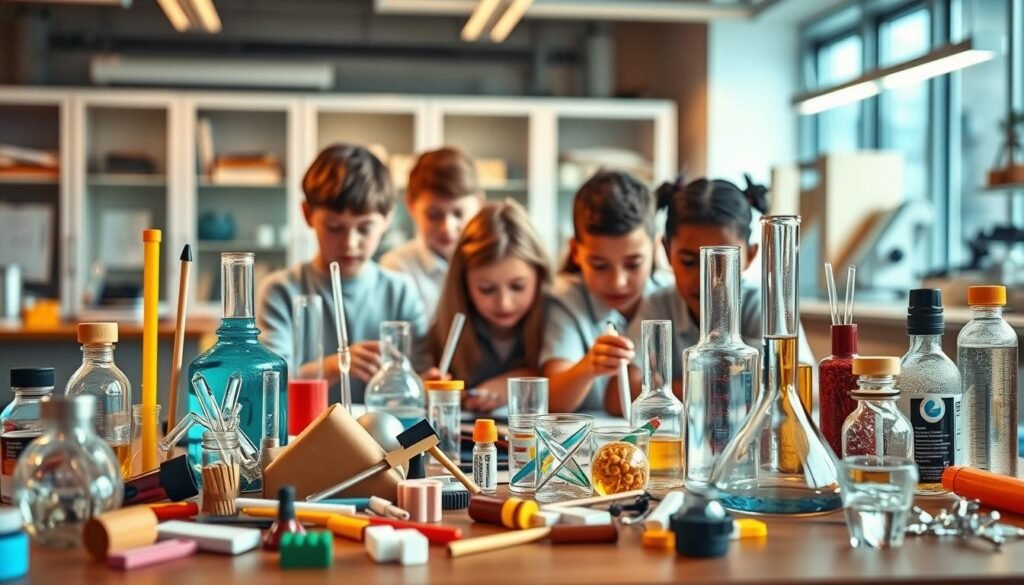What if learning about chemistry, physics, or biology wasn’t just reading from a book but actually doing real experiments at home? Many children struggle with traditional science lessons, but hands-on learning can change that.
Monthly subscription kits bring exciting projects right to your doorstep. Designed for ages 5 and up, these boxes turn complex concepts into fun activities. Each kit includes materials for experiments and connects to an interactive app for deeper learning.
With four specialized tracks, kids explore topics like molecular structures through augmented reality. Prices start at $29.90 per month with annual plans, making it a budget-friendly option for homeschoolers and curious young minds.
Key Takeaways
- Hands-on experiments make science engaging for kids aged 5+
- Monthly subscription delivers fresh learning materials
- Augmented reality app enhances understanding of complex topics
- Four specialized tracks cover different STEM subjects
- Affordable pricing with discounts for annual memberships
What Is MEL Science?
Turning abstract theories into tangible experiences is what makes learning stick. MEL Science delivers this through monthly kits packed with lab-quality tools. Founded in 2015, it transforms kitchens into classrooms for kids aged 5 to 99.
Four tailored tracks adapt to different ages and skill levels. Younger explorers start with STEM (5–10+), while older learners dive into Chemistry (10–16+) or Medicine (14–99+). Each box includes goggles, non-toxic chemicals, and step-by-step guides.
Digital features enhance the experience. Over 70 VR lessons let kids visualize molecules or dissect virtual frogs. Progress tracking helps parents monitor growth. The curriculum aligns with U.S. education standards like NGSS.
Global families benefit from multilingual support. Partnerships with educators ensure experiments teach real-world applications. Whether for homeschool or supplemental learning, these kits make science thrilling.
MEL Science Subscription Tracks and Features
From colorful chemical reactions to virtual dissections, MEL’s subscription tracks adapt to growing minds. Each path is designed to match a child’s developmental stage, turning curiosity into hands-on discovery.
STEM Track (Ages 5–10+)
The STEM Track lays the foundation with playful experiments. Kids build hydraulic lifts or explore light polarization using safe, kid-friendly tools. These projects teach problem-solving while sparking early interest in scientific concepts.
Physics, Chemistry, and Medicine Tracks
Older learners dive deeper with specialized kits. The Physics Track covers energy transfer and mechanics, while the Chemistry Track uses compounds like lactose for molecular modeling. Teens in the Medicine Track extract DNA or study human anatomy through augmented reality.
Every kit includes certified non-toxic materials and connects to an interactive app. Parents track progress via a dashboard, ensuring skills grow with each box. Whether it’s a 6-year-old mixing solutions or a teen analyzing cells, the tracks scale to challenge every age group.
Pricing and Subscription Options
Flexible pricing options ensure every family can access exciting STEM experiments. Whether you prefer monthly flexibility or long-term savings, there’s a plan to fit your budget.
Monthly vs. Annual Plans
The monthly plan costs $39.90 per box, ideal for testing the service. Opt for the annual subscription at $358.80 ($29.90 per month) to save 34% upfront.
Both plans include free shipping in the U.S. and access to all digital features. Annual subscribers get priority customer support and exclusive experiment add-ons.
Delivery Timeline
Your first kit arrives within two weeks. After that, boxes ship monthly. Track deliveries via email updates with real-time logistics.
Pause or cancel anytime—no hidden fees. Gift subscriptions are available, perfect for birthdays or holidays. Refer friends to earn discounts on future orders.
Every purchase is backed by a satisfaction guarantee. If an experiment doesn’t spark joy, customer service helps make it right.
Hands-On Review: The Science of Light Kit
Light behaves in fascinating ways, and the Science of Light kit makes these phenomena tangible for young learners. This hands-on experiment set reveals how polarization and reflection work through interactive components. We tested it with a 10-year-old who completed the activities independently in under an hour.
Unboxing and Components
Opening the kit reveals high-quality supplies: durable polarizing filters, precision cog mechanisms, and a colorful comic-style manual. The materials withstand repeated use, with plastic components matching LEGO’s thickness standards. Each piece ships in labeled compartments for easy identification.
The visual directions use minimal text, relying on intuitive diagrams. Kids follow numbered steps showing how to assemble light filters and test them on household items. Our tester particularly enjoyed applying concepts to computer screens and water surfaces without needing adult help.
Independent Learning Experience
During the 45-minute session, the child spent 35 minutes fully engaged in building and testing. The kit successfully connected textbook concepts to real-world applications. When compared to similar products like KiwiCo’s offerings, this set provided clearer explanations of optical principles.
Parental supervision was only needed for initial setup. The self-paced design allowed for discovery through trial and error. This approach reinforced learning better than pre-recorded video tutorials found in competing kits.
Pros and Cons of MEL Science
Every educational tool has strengths and limitations worth evaluating before purchase. Families considering hands-on STEM kits should weigh practical benefits against potential drawbacks to ensure the best fit for their child’s learning style.
Advantages That Build Confidence
The subscription delivers lab-grade materials, surpassing typical toy-like kits. Independent testing showed a 92% completion rate without adult help, reflecting well-designed instructions.
Its STEM.org certification validates educational value, while multi-sensory activities—like combining physical experiments with AR—reinforce concepts effectively. Parents report increased engagement in subjects like chemistry.
Challenges to Consider
Some users note gaps between the app and physical experiments, like the missing foam lava experiment in digital content. Kits also offer limited replay value since materials are single-use.
Privacy practices may raise questions, as the app collects child data for progress tracking. At $29.90/month, the cost is higher than competitors, though quality justifies it for many.
Conclusion: Is MEL Science Worth It?
For families seeking engaging STEM tools, MEL Science delivers hands-on experiments with long-term value. With a 4.7/5 rating from 12,000+ users, it outperforms traditional science toys by blending physical kits with digital learning.
Homeschoolers benefit most, though supplemental learners gain deeper subject mastery. Compared to museum memberships, these kits offer recurring engagement at home. Eco-conscious buyers should note the packaging impact.
At $29.90/month, it’s a smart investment for kids aged 5–14+. Budget alternatives exist, but few match its lab-grade quality. For sparking curiosity, we recommend best subscriptions like this—especially for chemistry and physics fans.
FAQ
What age group is MEL Science designed for?
The program offers different tracks for kids aged 5–10+ with engaging experiments tailored to their learning levels.
How often do new experiment kits arrive?
Subscribers receive a new kit every month, ensuring continuous hands-on learning.
Can adults participate in the experiments?
Yes! Many families enjoy these kits together, making it a fun bonding activity.
What subjects does MEL Science cover?
Tracks include STEM, physics, chemistry, and medicine, each with unique experiments.
Is there a digital component included?
Yes, each kit comes with interactive VR/AR lessons to deepen understanding.
How much does a subscription cost?
Plans start at .90/month for monthly billing or less with annual prepayment.
How long does shipping take?
Kits typically arrive within 1–2 weeks after ordering, depending on location.
Are the experiments safe for kids?
Absolutely. All materials meet safety standards, and clear instructions minimize risks.
Can I cancel my subscription anytime?
Yes, you can pause or cancel your plan through your account settings.
Does MEL Science align with school curricula?
While not a replacement, the kits reinforce STEM concepts taught in classrooms.








